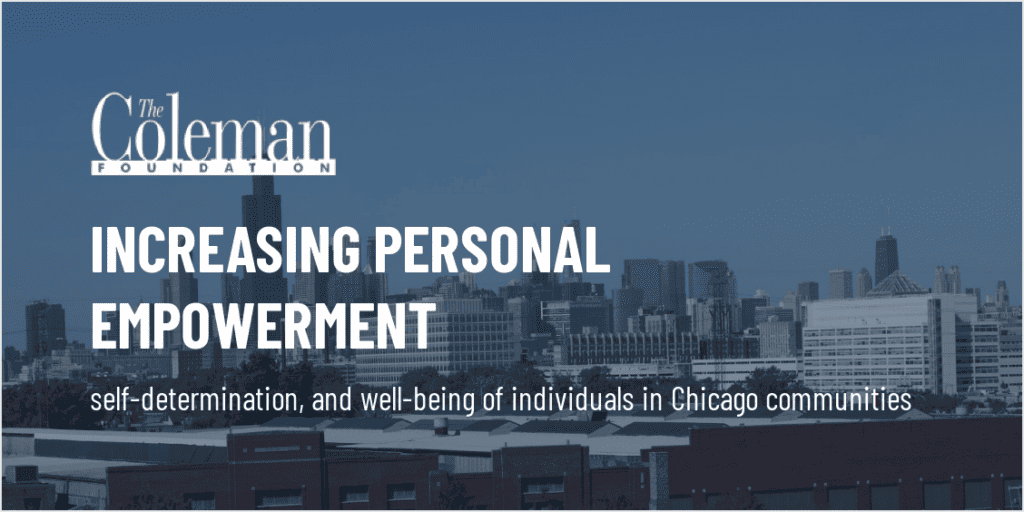November 2020: From The Corner Office

This week Shelley Davis will take the helm of The Coleman Foundation. The Coleman Foundation invests about $8 million each year in programs that advance personal empowerment and well-being for residents of the Chicago Metro area. Shelley will succeed Michael Hennessy who began working with the Foundation in 1987 when he was an officer of Fannie May Candy Company and became the Coleman Foundation’s president in 1993.
We checked in with Shelley to hear her thoughts upon starting her new role.
How will you approach your first 100 days?

What is most important to me is that we approach our work with integrity and transparency. I hope people will know that I will always keep The Coleman Foundation’s mission front and center
What was it like for you growing up in Chicago?
I grew up in South Shore, the Jackson Park Highlands, on Chicago’s south side. The Highlands are a special place of idyllic single-family homes. It’s a neighborhood made for kids. I grew up across the street and down the street from lots of Chicago leaders. Gayle Sayers’ children lived across the street. Ramsey Lewis’ kids were 2 blocks away. Jesse Jackson’s family was 2 blocks away. When people talk about Chicago’s South Side, they usually picture dangerous poor neighborhoods — but we are more complex than that. Like any middle-class family we used to play outside, ride our bikes, run around to each other’s houses, and go on vacations. I always felt safe in my community
When you are not working, where might one expect to run into you around town?
I still live South, in the Bronzeville neighborhood. My husband is a professor of sociology at the University of Chicago. My daughter is a junior at Whitney Young High School, where I went to school. My son is in 7th grade at Lab School. And my mom is a retired Chicago Public School librarian and lives in Hyde Park.
During the pandemic shelter-in-place order, my family and I liked to take long Sunday walks. Along the way, we call friends to come out to their front porches and we’d visit from the sidewalk. It was like caroling- but without the Christmas cheer.
In “normal times,” a good place to run into us is on the lawn at Ravinia, The 57th Street Festival, the Hyde Park Jazz Festival, the African Festival of the arts, and exploring farm-to-table restaurants. We like to eat well, listen to live music, and socialize with friends.
How has your experience as a lifelong Chicagoan shaped your vision for philanthropy?
Philanthropy in Chicago is a tight community, we know each other well. We natives may move away during college and early career, like I did, but then we tend to come home. Those who choose Chicago usually stay a long time. It sets up deep long relationships based on trust so we can respond quickly when things happen. A good example of this is the Chicago Community COVID-19 Response Fund, in which Coleman is a participant, formed very fast. It accelerated getting resources out to people and communities in need. I think the collective funding model will be increasingly important as we address the big challenge of crisis recovery going forward.
How do you think foundations should help address some of the big challenges we’re facing, like unemployment, income inequality, health care, and political divisions?
Foundations have to do our best to address some of those challenges. We can fund initiatives that create models, prove efficacy, develop and test policies, grow local businesses, and advocate for change. But we can only do so much. We have to push the corporate community and the public sector to do better, to reinvest locally, and to hire local talent.
There is always a lot of work to do to think through how to best leverage our investments. Together We Rise is a new collaborative initiative in which Coleman is a partner. Coleman has expertise in funding entrepreneurship, which will be valuable to the collaboration. We want to have a proactive impact in terms of how we start restoring and rebuilding Chicago South and West side neighborhoods. I’m looking at that as one of our North Stars.
On the racial equity question, the events of this summer led a lot of organizations to write racial equity statements, but what does it all mean? I am more interested in learning how philanthropy should be investing in programs and practices that measurably change systems that are structurally biased based on race. That’s what will make this moment stick.
How do you envision the Foundation under your leadership engaging with and participating in the community?
Collaboration and direct partnerships with our grantees will continue to be critical. We will see what our strategic planning process directs us to do. We always must find a balance between leading and being the first out gate, joining, and following. There is a time and place for us to do all three. As we implement our strategic plan, we’ll most likely toggle between them.


